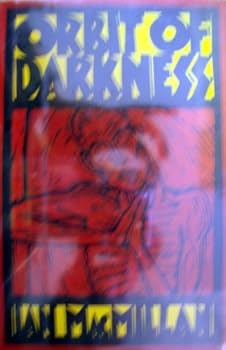Orbit of Darkness
No Synopsis Available.
Format:Hardcover
Language:English
ISBN:0151700958
ISBN13:9780151700950
Release Date:January 1991
Publisher:Houghton Mifflin Harcourt P
Length:305 Pages
Weight:1.20 lbs.
Dimensions:1.2" x 5.8" x 8.6"
Customer Reviews
1 rating
Disturbing, detached, unsettling
Published by Thriftbooks.com User , 21 years ago
From varied narrators and perspectives, MacMillan takes you through the ebb and flow of the blitzkrieg on the Eastern Front of WWII, interspersing the starvation of a saintly priest (apparently based on Maximilian Kolbe, for the fiction seesm so follow the fact) and his cellmates at Auschwitz. No triumph of the indomitable human spirit or uplifting morality for MacM's gallery of survivors, perpetrators, and victims. While you admire the starving priest, you also sense the objective view of his "martyrdom." Such a "fly on the wall" distancing shows that powerful fiction still can emerge from reality whose terrain seems to have been thoroughly excavated in the past half century.MacM's style does not draw you in and it does not repel you. It lists, it describes, and it moves on. His perspective takes in more than the stereotypical "survivor" account--he looks at partisan fighters in the marshes, a family reduced (most of them unwittingly at first) to cannibalism, a Nazi soldier as Berlin falls, fighters in the sewers of Warsaw, functionaries turned documentarians of pornography, and teens who witness from afar a scene that begins "they were shooting the wedding party into a ditch." This is the part of the array provided by MacM, who later wrote a novelization of the Treblinka uprising, "Village of a Million Spirits." His work deserves attention, for it shows how writers outside of direct involvement with the Shoah can enter into its imaginative possibilities and continue to confront us with the moral and dramatic struggles it keeps raising in the imagination of all of us who grow up in its receding but still chilling shadows.






